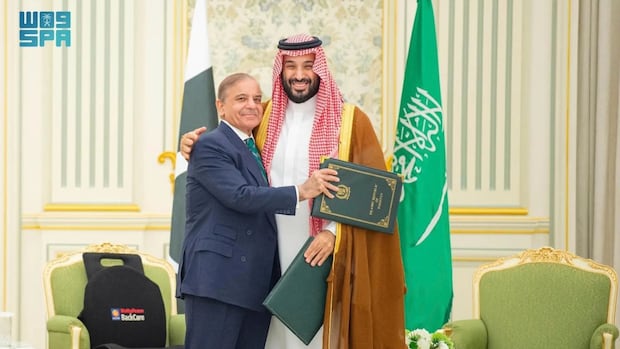Pakistan’s Defense Minister said his nation’s nuclear program “would be provided” to Saudi Arabia if necessary in the new defense pact of the countries.
The comments of the Minister of Defense Khawaja Mohammad Asif to Geo TV late Thursday night was the first specific recognition that Pakistan put Saudi Arabia under the umbrella of his nuclear weapons.
“What we have and the opportunities we have will be provided to (Saudi Arabia) under this agreement,” Asif said.
“If each country is attacked, we will respond jointly,” he added.
The two countries signed a defense deal on Wednesday, saying an attack on a nation would be an attack against both.
No country answered questions about the Pact and what it meant regarding any access to the nuclear arsenal of Pakistan.
Saudi Arabia is believed to have an internal ballistic missile program that can be a nuclear weapon supply system. However, the kingdom is a member of the contract for nuclear non -proliferation and is not known to have switched to the acquisition of the bomb through its own work.
Saudi Arabia sought US assistance to achieve a civil nuclear energy program, partly with the proposed diplomatic recognition deal with Israel, as US President Donald Trump hoped to expand to expand Abraham Agreements To include Saudi Arabia during its second term. But Riyadh made it clear that he would not establish ties with the Israelis until the Israeli War ceased and had a way to Palestinian statehood.
Long -standing Saudi financial support
This week, the move has been seen by some as a signal to Israel, and it has long been thought to be the only nuclear armed nation in the Middle East. This comes after Israel’s attack on Hamas leaders in Qatar last week, killed six people and caused new concerns in the Arab Gulf of Arab about their safety against the backdrop of the Israeli war.
Saudi Arabia has long been linked to Pakistan’s nuclear program. Retired Pakistani Brig. General Ferrosis Hassan Khan said Saudi Arabia provided “generous financial support to Pakistan, which enabled the nuclear program to continue, especially when the country was under sanction”, referring to US sanctions for years for the pursuit of the bomb.

The requested nuclear doctrine of Pakistan says his weapons are only focused on a long-term opponent India, with both countries nuclear in the 1990s.
Pakistan, the only Muslim nation with nuclear weapons, is one of the poorer countries in Asia, but there is an army of more than 600,000 soldiers to defend themselves against its much larger opponent, with which it was fought with three major wars. The countries had many smaller clashes, including a four-day conflict in May, which was their worst battle in decades.
India is believed to have about 172 nuclear warheads, while Pakistan has 170, according to the US newsletter published by the United States.
But Pakistan is struggling to compete with the India defense budget, which is at least seven times larger, which means that any new injection of Saudi Arabia funds can even balance to some extent. The links between the countries have increased after the Islamic Revolution in Iran since 1979 and the fears of the Kingdom of a confrontation with Tehran, and Saudi Arabia has Helped Pakistan financially for decadesS
Pakistan Prime Minister Shehbaz Sharif thanked Saudi Crown Prince Mohammed bin Salman for his “passionate interest in expanding Saudi investments, commercial and business ties” in a statement on Thursday.
India said on Thursday that “it will investigate the consequences of this development for our national security as well as for regional and global stability.”
Israel and the US have not made a comment on the deal.
https://i.cbc.ca/1.7638011.1758276793!/fileImage/httpImage/image.jpg_gen/derivatives/16x9_1180/pakistan-saudi-arabia.jpg?im=Resize%3D620
2025-09-19 12:01:20

